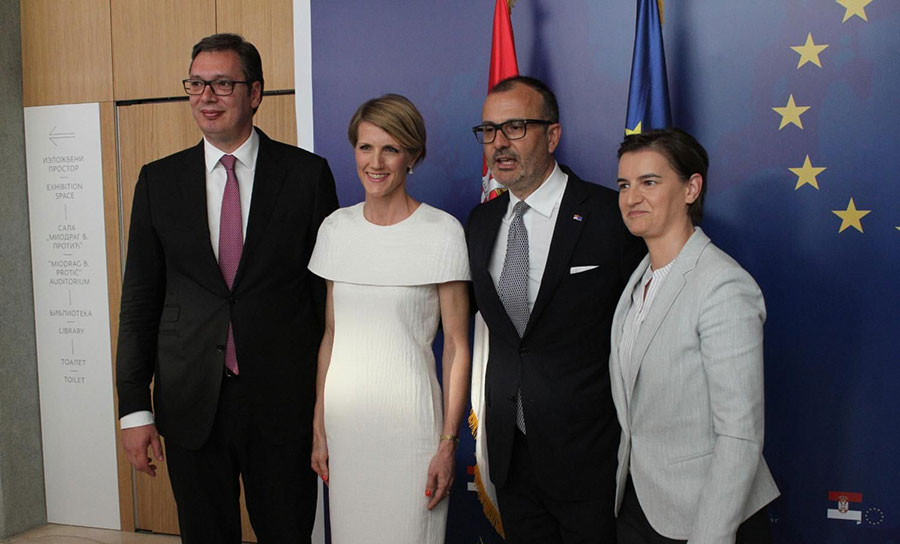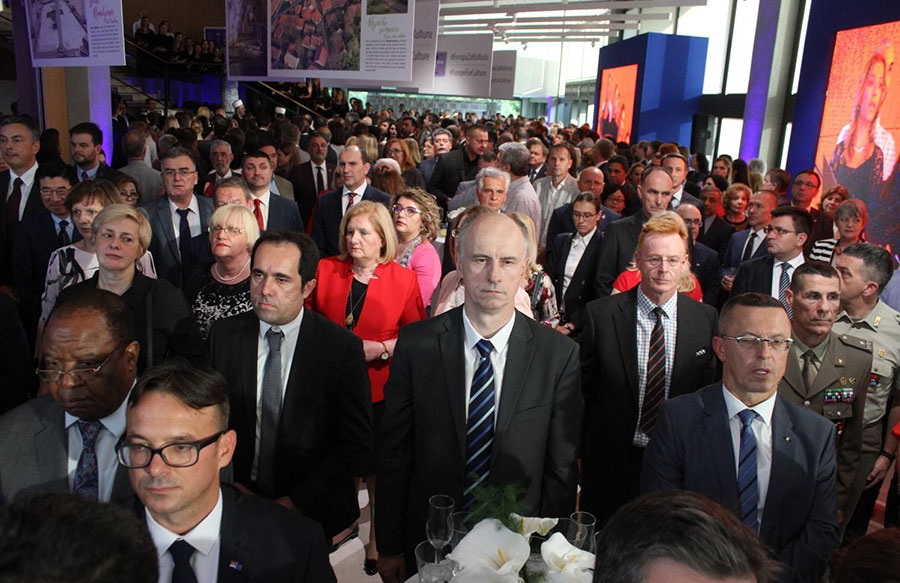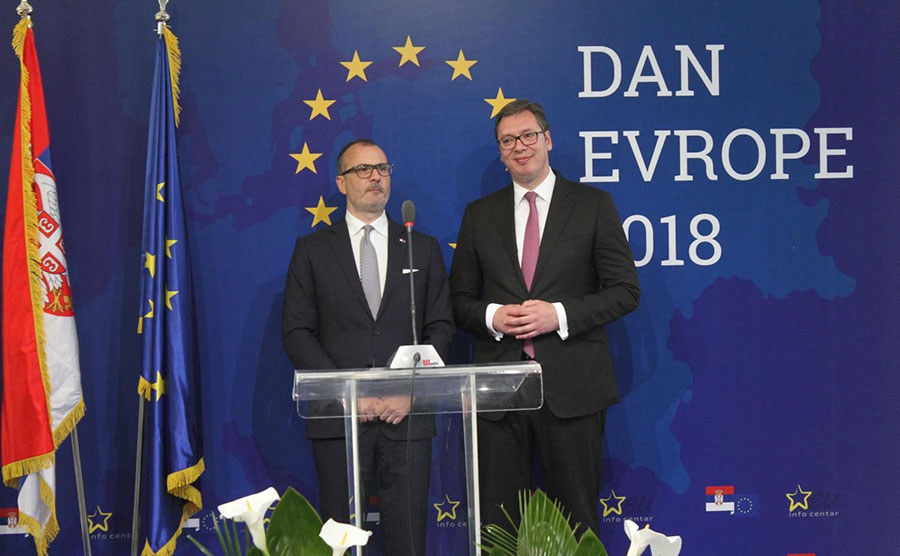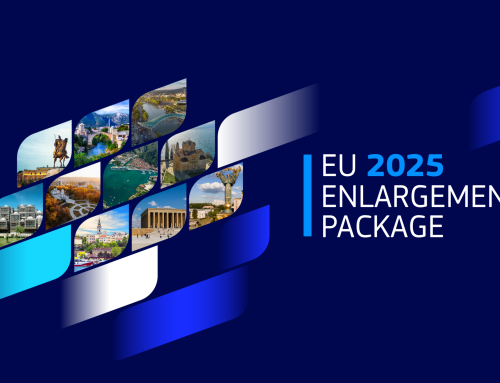The EU Delegation to Serbia celebrated Europe Day, 9 May, at the Museum of Contemporary Art in Belgrade. Apart from Ambassador Sem Fabrizi, the event was attended by Serbian President Aleksandar Vucic and Prime Minister Ana Brnabic as well as numerous politicians, academia, civil society representatives, media, businesspeople and diplomatic corps.
Launching the event, the Stankovic Music School choir performed Serbian and EU anthems. Ambassador Fabrizi than gave his opening remarks, wishing everybody welcome and saying he was happy to celebrate Europe’s birthday together with Serbian friends.
“The history reminds us that the European project was born in difficult circumstances, following a period of devastation and suffering in Europe. Shortly after World War II, EU’s founding fathers decided that the war was no longer an option and that the time has come to bring peace and lasting reconciliation between enemies. What Europe needed was democracy, social and economic development. The European Union was not conceived easily, as Robert Schuman put it on this day 68 years ago: ’Europe will not be made all at once, or according to a single plan. It will be built through concrete achievements which first create a de facto solidarity.” This visionary but nonetheless pragmatic approach has helped to make all the achievements we have made in the past seven decades. Europe has been re-established, freed from devastating nationalism, becoming one of the world’s largest economies, human rights defenders, a shelter for those who flee their countries because of war or persecution, and an important player in global security,” Fabrizi said.
 Nowadays, he added, some remain suspicious of multilateralism and global cooperation, while others have tried to solve problems by taking shortcuts and unilateral actions, threatening human rights all over the globe. On the other hand, he said, the EU firmly stands by its values.
Nowadays, he added, some remain suspicious of multilateralism and global cooperation, while others have tried to solve problems by taking shortcuts and unilateral actions, threatening human rights all over the globe. On the other hand, he said, the EU firmly stands by its values.
“We believe that cooperation is better than conflict, that the strength and not weakness lies in compromise and that reconciliation is a positive concept. In the spirit of openness and pragmatism, the EU leaves its door open for Serbia, the country that has set the EU as its ultimate goal, one that greatly transcends matters of foreign policy. That goal implies the transformation of the society as a whole, toward sustainable development, lasting democracy and the rule of law,” Ambassador Fabrizi said.
In his speech, Serbian President Aleksandar Vucic said that once WWII had ended – offering the most painful lesson in the history of mankind – European nations rightly saw reconciliation and unity as the preconditions to build future.
 “Those visionaries have paved the path the modern Europe is walking today, with all the ups and downs that make it more resilient and stronger. No matter how difficult that path might have been, Serbia has never strayed too far from it, regardless of the form of government it has taken over time. At times, Serbia and Europe did not fully understand each other, but the truth is that we have always changed, trying to improve our understanding of Europe, its needs and requirements, and I’d say that Europe is getting better at understanding Serbia and the needs of its people as well. I am convinced that that the EU – being one of the most developed regions in the world, one of the biggest development assistance donors, an increasingly important actor in tackling security issues around the world, and being a region of peace, freedom and prosperity – wants Serbia as its full-fledged member, as much as we want to become a part of it,” Vucic said.
“Those visionaries have paved the path the modern Europe is walking today, with all the ups and downs that make it more resilient and stronger. No matter how difficult that path might have been, Serbia has never strayed too far from it, regardless of the form of government it has taken over time. At times, Serbia and Europe did not fully understand each other, but the truth is that we have always changed, trying to improve our understanding of Europe, its needs and requirements, and I’d say that Europe is getting better at understanding Serbia and the needs of its people as well. I am convinced that that the EU – being one of the most developed regions in the world, one of the biggest development assistance donors, an increasingly important actor in tackling security issues around the world, and being a region of peace, freedom and prosperity – wants Serbia as its full-fledged member, as much as we want to become a part of it,” Vucic said.
He said that Serbia remained deeply committed to the stability of the region and its accession process, adding that efforts made would yield results in the end.
“When people ask: Why do you want to make part of the EU?, an ordinary man probably says because it will improve the economy and the quality of people’s lives. Others would go on to say another thing – one that seems more important to me – because Europe as a peace project is important for us as it will help us maintain peace and stability. And if there’s a nation that is fed up with waging wars, it’s Serbia. I would add the third, perhaps the most vital reason: people of Serbia want to belong to the European type of society, meaning they want to live in a free and democratic society. There is much work ahead of us, much changing to do. This does not mean that all EU countries are perfect and faultless; on the contrary, it means that the work never stops and that they always make a step forward for the sake of their citizens,” he said.
Following the introductory speeches, Ambassador Fabrizi and Prime Minister Brnabic saw the exhibition featuring pieces from high school pupils, winners of the Europa Diary contest. The cocktail party followed the exhibition and the event ended with lighting up the Pobednik monument in Kalemegdan with the colour of the EU flag.




